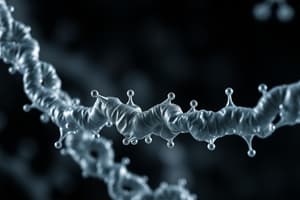Podcast
Questions and Answers
Which biomolecule serves as a major energy source for cells?
Which biomolecule serves as a major energy source for cells?
- Proteins
- Lipids
- Nucleic Acids
- Carbohydrates (correct)
What is the primary function of lipids in living organisms?
What is the primary function of lipids in living organisms?
- Enzyme activity
- Insulation (correct)
- Tissue structure
- Immune response
Which major element is essential in nucleic acids for carrying genetic information?
Which major element is essential in nucleic acids for carrying genetic information?
- Carbon
- Oxygen
- Nitrogen (correct)
- Hydrogen
What mnemonic can help remember the major elements in biomolecules?
What mnemonic can help remember the major elements in biomolecules?
Which biomolecule is responsible for tissue structure and enzyme activity in living organisms?
Which biomolecule is responsible for tissue structure and enzyme activity in living organisms?
Flashcards are hidden until you start studying
Study Notes
- Biomolecules are large molecules necessary for life, including Carbohydrates, Lipids, Proteins, and Nucleic Acids.
- Carbohydrates serve as a major energy source for cells, with glucose being a key monosaccharide used in cellular respiration.
- Lipids, including fats and oils, are hydrophobic and play roles in long-term energy storage, insulation, membrane structure, and hormone production.
- Proteins, made up of amino acids, are vital for tissue structure, cell membrane function, enzyme activity, and immune response.
- Nucleic acids like DNA and RNA are comprised of nucleotides and carry genetic information essential for cell traits and functions.
- Plants have cell walls made of carbohydrates like cellulose, while lipid structures form cell membranes and play roles in insulation and hormone production.
- The mnemonic "CHONP" helps remember the major elements in biomolecules: Carbon, Hydrogen, Oxygen, Nitrogen, and Phosphorus.
Studying That Suits You
Use AI to generate personalized quizzes and flashcards to suit your learning preferences.




